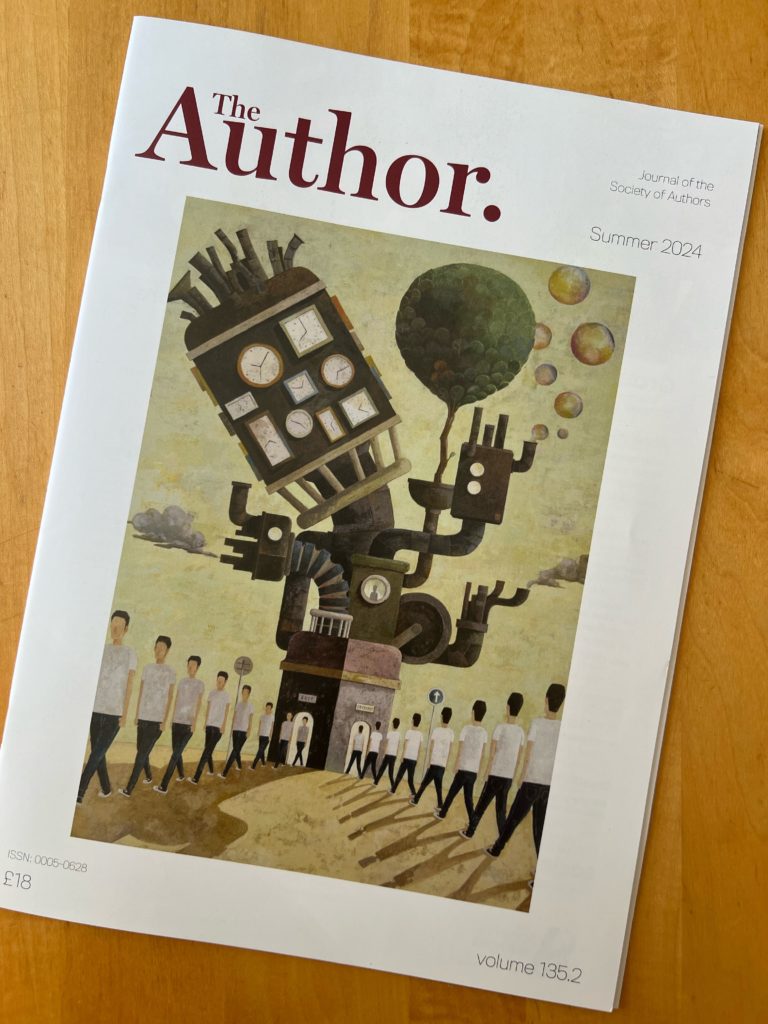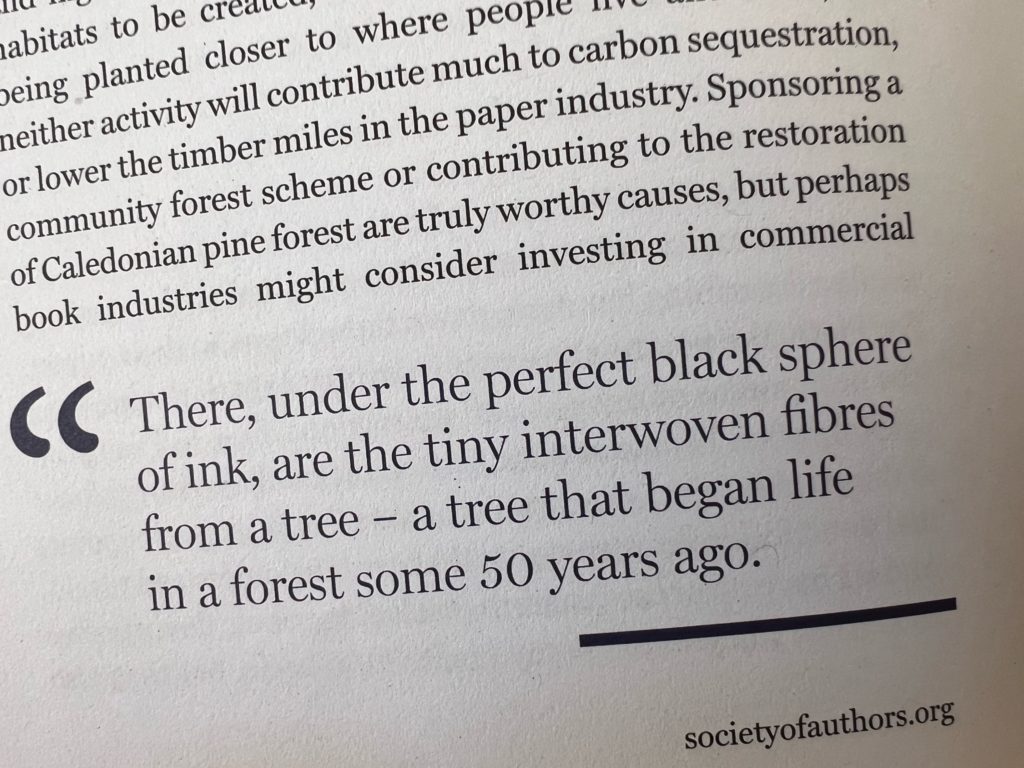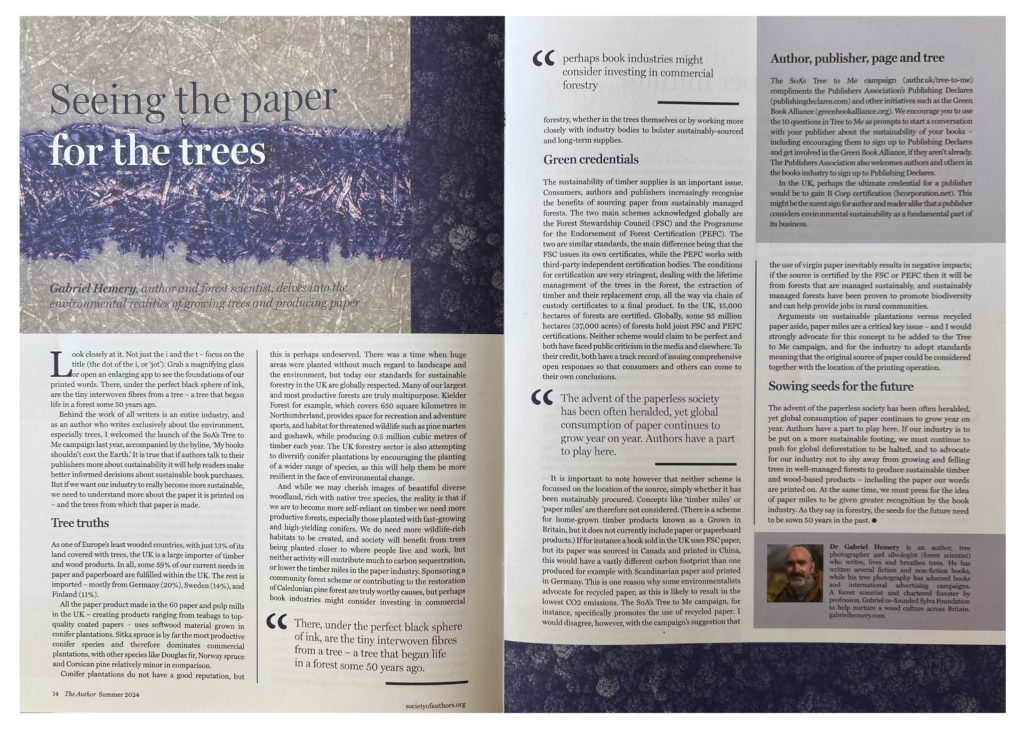
The following article by Gabriel Hemery was first published in the Summer 2024 edition of The Author, the journal of the Society of Authors.
Look closely at it. Not just the i and the t – focus on the tittle (the dot of the i, or ‘jot’). Grab a magnifying glass or open an enlarging app to see the foundations of our printed words. There, under the perfect black sphere of ink, are the tiny interwoven fibres from a tree – a tree that began life in a forest some 50 years ago.

Behind the work of all writers is an entire industry, and as an author who writes exclusively about the environment, especially trees, I welcomed the launch of the SoA’s Tree to Me campaign last year, accompanied by the byline, ‘My books shouldn’t cost the Earth.’ It is true that if authors talk to their publishers more about sustainability it will help readers make better informed decisions about sustainable book purchases. But if we want our industry to really become more sustainable, we need to understand more about the paper it is printed on – and the trees from which that paper is made.
Tree Truths
As one of Europe’s least wooded countries, with just 13% of its land covered with trees, the UK is a large importer of timber and wood products. In all, some 59% of our current needs in paper and paperboard are fulfilled within the UK. The rest is imported – mostly from Germany (20%), Sweden (14%), and Finland (11%).
All the paper product made in the 60 paper and pulp mills in the UK – creating products ranging from teabags to top-quality coated papers – uses softwood material grown in conifer plantations. Sitka spruce is by far the most productive conifer species and therefore dominates commercial plantations, with other species like Douglas fir, Norway spruce and Corsican pine relatively minor in comparison.
Conifer plantations do not have a good reputation, but this is perhaps undeserved. There was a time when huge areas were planted without much regard to landscape and the environment, but today our standards for sustainable forestry in the UK are globally respected. Many of our largest and most productive forests are truly multi-purpose. Kielder Forest for example, which covers 650 square kilometres in Northumberland, provides space for recreation and adventure sports, and habitat for threatened wildlife such as pine marten and goshawk, while producing 0.5 million cubic metres of timber each year. The UK forestry sector is also attempting to diversify conifer plantations by encouraging the planting of a wider range of species, as this will help them be more resilient in the face of environmental change.
And while we may cherish images of beautiful diverse woodland, rich with native tree species, the reality is that if we are to become more self-reliant on timber we need more productive forests, especially those planted with fast-growing and high-yielding conifers. We do need more wildlife-rich habitats to be created, and society will benefit from trees being planted closer to where people live and work, but neither activity will contribute much to carbon sequestration, or lower the timber miles in the paper industry. Sponsoring a community forest scheme or contributing to the restoration of Caledonian pine forest are truly worthy causes, but perhaps book industries might consider investing in commercial forestry, whether in the trees themselves or by working more closely with industry bodies to bolster sustainably-sourced and long-term supplies.
Green Credentials
The sustainability of timber supplies is an important issue. Consumers, authors and publishers increasingly recognise the benefits of sourcing paper from sustainably managed forests. The two main schemes acknowledged globally are the Forest Stewardship Council (FSC) and the Programme for the Endorsement of Forest Certification (PEFC). The two are similar standards, the main difference being that the FSC issues its own certificates , while the PEFC works with third-party independent certification bodies. The conditions for certification are very stringent, dealing with the lifetime management of the trees in the forest, the extraction of timber and their replacement crop, all the way via chain of custody certificates to a final product. In the UK, 1.5Mha of forests are certified. Globally, some 95 million hectares of forests hold joint FSC and PEFC certifications. Neither scheme would claim to be perfect and both have faced public criticism in the media and elsewhere. To their credit, both have a track record of issuing comprehensive open responses so that consumers and others can come to their own conclusions.
It is important to note however that neither scheme is focussed on the location of the source, simply whether it has been sustainably procured. Concepts like ‘timber miles’ or ‘paper miles’ are therefore not considered. There is a scheme for home-grown timber products known as a Grown in Britain, but it does not currently include paper or paperboard products. If for instance a book sold in the UK uses FSC paper, but its paper was sourced in Canada and printed in China, this would have a vastly different carbon footprint than one produced for example with Scandinavian paper and printed in Germany. This is one reason why some environmentalists advocate for recycled paper, as this is likely to result in the lowest CO2 emissions. The SoA’s Tree to Me campaign, for instance, specifically promotes the use of recycled paper. I would disagree, however, with the campaign’s suggestion that the use of virgin paper inevitably results in negative impacts; if the source is certified by the FSC or PEFC then it will be from forests that are managed sustainably, and sustainably managed forests have been proven to promote biodiversity and can help provide jobs in rural communities. Arguments on sustainable plantations versus recycled paper aside, paper miles are a critical key issue – and I would strongly advocate for this concept to be added to the Tree to Me campaign, and for the industry to adopt standards meaning that the original source of paper could be considered together with the location of the printing operation.
Sowing Seeds for the Future
The advent of the paperless society has been often heralded, yet global consumption of paper continues to grow year on year. Authors have a part to play here. If our industry is to be put on a more sustainable footing, we must continue to push for global deforestation to be halted, and to advocate for our industry not to shy away from growing and felling trees in well-managed forests to produce sustainable timber and wood-based products – including the paper our words are printed on. At the same time, we must press for the idea of paper miles to be given greater recognition by the book industry. As they say in forestry, the seeds for the future need to be sown 50 years in the past.

The SoA’s Tree to Me campaign compliments the Publishing Association campaign Publishing Declares (publishingdeclares.com) and other initiatives such as the Green Book Alliance (greenbookalliance.org). Authors are encouraged to ask their publishers if they have signed up to any of these campaigns. In the UK, perhaps the ultimate credential for a publisher is to gain B Corp certification (bcorporation.net); this is perhaps the surest sign for author and reader alike that a publisher considers environmental sustainability as a fundamental part of its business.
 This work is licensed under a Creative Commons Attribution- NonCommercial- NoDerivs 3.0 United States License.
This work is licensed under a Creative Commons Attribution- NonCommercial- NoDerivs 3.0 United States License.
